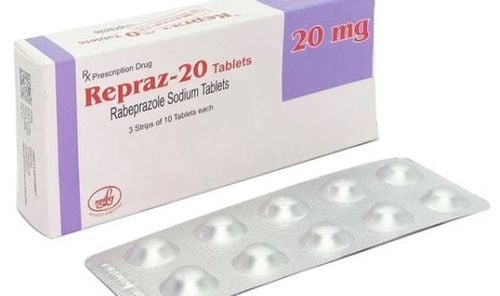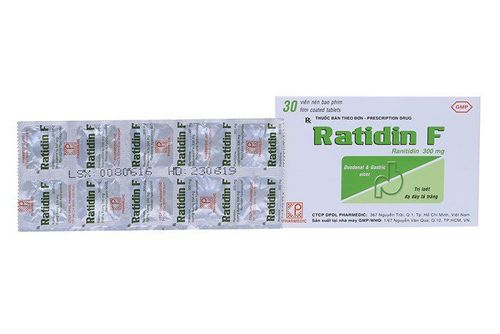This is an automatically translated article.
Repraz 20 mg drug is prepared in the form of film-coated tablets, the main ingredient is sodium rabeprazole 20mg. This drug needs to be used in the right dose and subject to avoid unwanted side effects.
1. The effect of the drug Repraz 20
Repraz-20 is indicated for use in the following cases:
Treatment of acute gastric ulcer, acute duodenal ulcer, gastroesophageal reflux syndrome (with or without esophagitis, abrasions) scratches, ulcers); Treatment for people with Zollinger - Ellison syndrome ; In combination with an appropriate course of antibiotics to destroy Helicobacter Pylori in patients with duodenal ulcer. Repraz-20 is contraindicated for the following cases:
People with hypersensitivity to rabeprazole, benzimidazole derivatives or components of the drug; Women who are pregnant and breastfeeding.

Thuốc Repraz 20 có thành phần chính là Natri rabeprazole 20mg
2. Usage and dosage of Repraz 20
2.1. How to use The drug is taken orally. The patient takes the tablet whole and does not break, chew, or crush the tablet.
2.2. Dosage Depending on the medical condition, the doctor will prescribe the drug with different dosage:
Acute duodenal ulcer: Take 1 tablet 20mg/time/day in the morning. Take medicine for 4 weeks if the ulcer has not healed completely; Benign acute gastric ulcer: Take 1 tablet 20mg/time/day in the morning. Take the medicine for 6 weeks. Continue taking for another 6 weeks if the ulcer has not healed completely; Gastroesophageal reflux with ulcer or scratch: Take 1 tablet 20mg/time/day for 4-8 weeks. The disease requires long-term treatment. For maintenance therapy, the dose is 10-20mg/time/day depending on the patient's response ability; Gastroesophageal reflux - oesophagitis without esophagitis: Take 10mg/time/day for 4 weeks; then take 10mg/time/day as needed. If symptoms are not controlled within 4 weeks, the patient needs to be re-examined; Duodenal ulcer, benign gastric ulcer combined with HP infection: Oral combination of the following drugs for 7 days: Rabeprazole 200mg/time x 2 times/day + clarithromycin 500mg/time x 2 times/day + amoxicillin 1g/time x 2 times/day; drink in the morning and evening; Zollinger - Ellison syndrome: The starting dose is 60mg/time/day. Dosage can be increased to a maximum of 120mg / day, divided into 2 times depending on the doctor's prescription. Your doctor may prescribe a dose of 100mg/time/day. The drug course lasts until the end of clinical symptoms; Patients with hepatic and renal impairment: No dose adjustment is required; Children: Do not use Repraz 20. The above dosage of Repraz is for reference only. Doctors may assign patients to use drugs with different dosages depending on their health status, ability to respond to drugs,...
2.3. Overdose There is no specific antidote and cannot be eliminated by dialysis. In case of overdose, the patient should be treated symptomatically and supportively.
2.4. Missed dose If a dose of Repraz 20 is forgotten, the patient should take it as soon as possible. If it is almost time for your next dose, skip the missed dose and take your next dose as scheduled.
3. Side effects of Repraz 20
When using Repraz, patients may experience some unwanted side effects:
Common: Headache, insomnia, dizziness, cough, rhinitis, sore throat, diarrhea, indigestion, pain stomach, flatulence, dry mouth, constipation, nausea, vomiting, weakness, skin rash, back pain, infection with flu-like symptoms; Uncommon: Restlessness, somnolence, dry mouth, belching, dyspepsia, skin itching, skin erythema, myalgia, arthralgia, cramps, urinary tract infection, increased liver enzymes, generalized chills, fever ; Rare: Leukopenia/leukocytosis, thrombocytopenia, neutropenia, hypertension, anorexia, gingivitis, gastritis, weight gain, taste disturbance, hepatitis, jaundice, disease hepatic encephalopathy, depression, visual disturbances, skin pruritus, sweating, bullous skin reactions, interstitial nephritis; Very rare: Erythema multiforme, toxic epidermal necrolysis, Stevens - Johnson syndrome; Other side effects: Hyponatremia, peripheral edema, gynecomastia in men. The side effects of Repraz are usually mild and go away when the medication is stopped. If you experience adverse reactions while using the drug, the patient should notify the doctor immediately.

Repraz 20 có thể gây ra một số tác dụng phụ cho người dùng
4. Be careful when using Repraz 20
Some notes users need to remember before using Repraz 20:
It is necessary to exclude the possibility that the patient has a malignant tumor before treatment with Repraz. If treatment lasts more than 1 year with Repraz, the patient should be examined periodically; Repraz should be used with caution because of the risk of hypersensitivity reactions to other proton pump inhibitors or benzimidazole derivatives when used instead; Do not give Repraz to children; There are cases of thrombocytopenia and neutropenia when using Repraz. In most cases, no cause can be found, but these disorders are not serious and usually resolve on their own after stopping Repraz; When using Repraz, there are cases of liver enzyme abnormalities. If there is no other cause, these enzyme disorders are not serious and resolve on their own after stopping Repraz. Caution should be exercised when appointing Repraz to patients with severe liver failure; Repraz is a proton pump inhibitor, which may increase the risk of gastrointestinal infections; Rabeprazole sodium should not be used in combination with atazanavir; Do not use Repraz in patients with galactose intolerance, Lapp lactase deficiency or glucose/galactose malabsorption; Repraz may affect the ability to drive or operate machines, so patients should not drive or operate machinery while taking the drug; Do not use Repraz for pregnant and nursing mothers.
5. Repraz 20 . drug interactions
Some Repraz drug interactions patients should be aware of:
Co-administration of rabeprazole with digoxin or ketoconazole resulted in a 33% decrease in ketoconazole levels and a 22% increase in digoxin trough concentrations in healthy patients. Therefore, individual patients should be monitored to determine if dose adjustment of these drugs is necessary when combined with Repraz; Do not co-administer rabeprazole with nelfinavir, erlotinib, delavirdine, posaconazole; Concomitant use of rabeprazole 40mg/day with atazanavir 300mg or ritonavir 100mg resulted in a sharp decrease in atazanavir concentrations; Rabeprazole may decrease the concentration or effect of clopidogrel, dabigatran, atazanavir, cetexilate, dasatinib, erlotinib, indinavir, itraconazole, ketoconazole, iron salts, mesalamine, mycophenolate, nelfinavir; Rabeprazole may increase the concentration or effect of drugs that are substrates of CYP2C8, CYP2C19, saquinavir, voriconazole, methotrexate. When using Repraz 20, patients need to strictly follow all instructions of the doctor about the dose and duration of taking the drug. If you experience any adverse side effects, you should tell your doctor right away.
Please dial HOTLINE for more information or register for an appointment HERE. Download MyVinmec app to make appointments faster and to manage your bookings easily.













